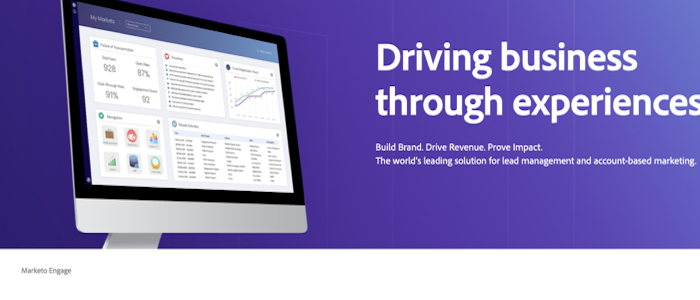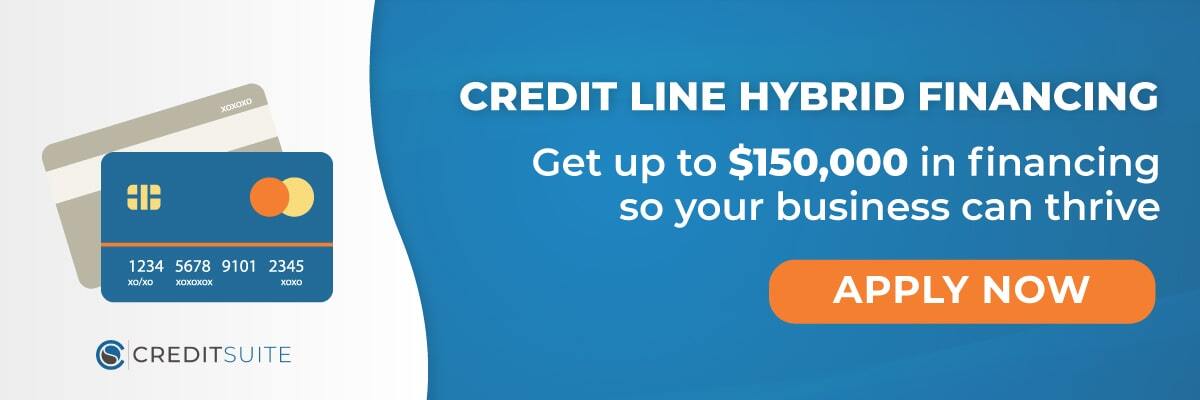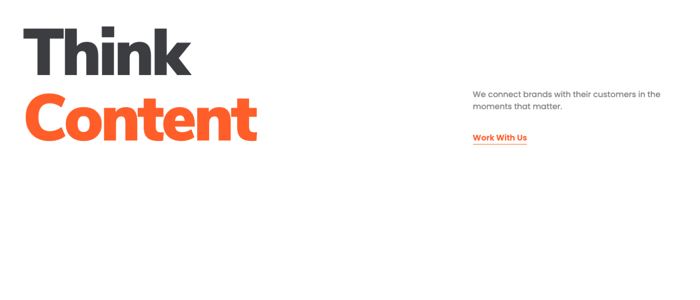Got a crawling, indexing, or site-wide ranking problem? SEO traffic isn’t just about having the right content. One wrong technical seo setting can bring your entire site down. And many technical errors are so obscure that they go unnoticed for years. Even small problems can add up, slowing you down and resulting in less traffic. … Continue reading How to Choose The Right Technical SEO Agency
Tag: Right
How to Choose The Right Technical SEO Agency
Got a crawling, indexing, or site-wide ranking problem?
SEO traffic isn’t just about having the right content.
One wrong technical SEO setting can bring your entire site down.
And many technical errors are so obscure that they go unnoticed for years.
Even small problems can add up, slowing you down and resulting in less traffic.
Technical SEO audits require specialized skills and in-depth expertise. Google is constantly changing it’s algorithms. If you want the audit done right, you’ll need someone that really knows that they’re doing.
Well, I have good news.
Step-by-step, I’ll walk you through how to choose a technical SEO agency that’s right for your business.
Whether you’re a small business that just needs an audit done right, or a major corporation that needs a complete SEO program, there’s an option for you.
Know Your Goals and Desired Outcomes
Most people only give technical SEO a second thought when things have gone south. It shouldn’t be this way.
Why?
Technical SEO is the backbone of every successful, long-term SEO strategy.
Here’s a few examples of when it’s worth making technical SEO a priority.
Example #1: Traffic Drops After Publishing More Content
Let’s say you started your content push to get higher Google rankings.
You created, published, and promoted in-depth blog posts.
After a while, Google rewards your efforts with higher rankings for some keywords. Your site traffic starts to increase.
Things are going well.
So you keep publishing more content. And that’s when things go bad.
Your traffic tanks.
More content doesn’t always yield more traffic. Sometimes, it shrinks your organic traffic from.
I know it sounds crazy but this happens all the time.
Bloated sites with duplicate content make it really hard for Google to figure out which pages of yours to rank.
What does Google do when they’re not sure what to rank? They usually rank nothing.
Duplicate content on your blog, a ton of similar pages that were created automatically, or telling Google to index internal URLs can all lead to problems.
If you see anything like this, get a technical SEO to help you.
Example #2: An Abrupt Traffic Drop
If you play the SEO game long enough, one of your sites will fall off a cliff overnight.
Years ago, our blog at KISSmetrics saw traffic drop by 40% in less than a month.
That dropped our monthly traffic by hundreds of thousands of visitors. The team scrambled to fix that.
Everyone goes through one of these.
And the first thing you want to do is reach out to a technical SEO.
Hopefully, it’s a simple fix like a bad robots.txt file. Even if it’s a bigger problem, you want a serious expert to pinpoint the issue and chart a course to get that traffic back.
4 Characteristics That Make a Great Technical SEO Company
Not all agencies can develop, let alone implement, advanced technical SEO strategies. A reason for this is that it requires specialized skills and vast experience.
So, how do you recognize those who can not only develop a technical SEO plan unique to your business but can also implement it for maximum results?
Such agencies work with a team of experts and the other characteristics I’ll discuss below.
1. Experience With Massive Sites
Smaller websites rarely have issues with technical SEO that are difficult to fix. In most cases, any problems can be solved by checking the robots.txt file, making sure the site is on a good platform (like WordPress or Shopify), and upgrading to a good web host.
If a small site struggles to rank, it’s usually because they need a lot more content and authority. Rarely is there a quick fix.
Large sites, however, are completely different.
When a site has millions of URLs, all sorts of insane problems come up. There can easily be thousands of junk URLs that never should have been indexed to begin with. Or terrible canonical errors that cause rampant duplication problems. Not to mention keeping everything clean between dozens of languages.
For sites like this, make sure you’re working with someone that has tons of experience working on larger sites.
Otherwise, they won’t have the experience need to spot your technical problems quickly.
2. A Holistic Process that Includes Technical SEO
As I’ve mentioned earlier, technical SEO is the backbone that gives your site structure. Occasionally, you will see some quick technical SEO fixes bring you traffic.
But what then?
After you fix your technical SEO, what’s your plan for growing SEO traffic over the long term?
We’ve seen lots of folks work on quick fixes and then never take the next step to growing their site by 2X, 5X, or 10X what they have now.
If it was me, I’d want to work with someone that could keep growing my site year in and year out. That’s where the real impact comes from.
If you have a gnarly technical SEO problem, work with a specialist. But an agency with deep SEO expertise across content, technical SEO, and promotion will take your business to an entirely different level.
3. Thought leadership
It takes patient experimentation to develop, plan, and implement technical SEO strategies.
And to show their processes and how they achieve results, exceptional technical SEO agencies publish their findings from experiments.
That’s one of the easiest ways to look for a top tier technical SEO agency. Find the folks that product the best content in the space.
After all, if they’re already doing great SEO, they can likely help your business too.
4. Been in the SEO Game Long Enough to Spot Patterns
Technical SEO can move really fast.
Google is always releasing new features, shutting down others, and changing their priorities.
It’s a shifting landscape.
Getting a great technical SEO that knows the rules today isn’t enough. Ideally, you’ll want to work with someone that knows where SEO is going in the coming months and years. Or at least can take a good guess at it.
The last thing anyone wants is to restructure their site and then have Google go in an entirely different direction.
How to Work With a Technical SEO Agency
Once you’ve picked an agency, then what?
How do you work with one? What should you expect when you hire technical SEO specialists?
Typically, the process looks like this.
1. In-house Team Alignment
Most technical SEO agencies work as an extension of your in-house marketing team.
To ensure the partnership between both parties starts smoothly, you should:
- Hold an in-house stakeholder meeting to align your teams.
- Communicate why you need to work with a technical SEO agency and how their work would impact your site and business.
- Make sure everyone is truly onboard with getting help. The agency may help find problems but internal teams need to be motivated to fix them.
- Appoint front-facing employees that’ll work directly with the agency.
When you do this, it ensures there’s team alignment between your company and the agency. It also keeps the agency in sync with your goals.
2. Discovery Session
The first task to expect when you contact a technical SEO agency is an invitation to share your business problems and needs relevant to technical SEO.
A reason for this is to understand your business situation better and get ideas from their vast pool of experience on the best approach to take.
This process starts with a discovery session.
The best technical SEO agencies are first there to help organizations develop customized strategies that drive business growth. But for them to help you, expect to share your needs via a discovery session.
3. A Paid Audit
For a lot of marketing agencies, they’ll do a bunch of research for free and pitch you a proposal on how they’ll accomplish your goals.
This usually makes a lot of sense. The marketing agency gives you a taste of what they can do, they charge for the execution of the plan itself.
Technical SEO agencies rarely work like that.
In their case, the value is the research. You’re hiring them to do a ton of digging on your site and surface every problem they can find.
So don’t expect free audits.
The agency usually has a standard rate based on the size of your site.
4. Audit Results
Once the audit is finished, expect a document that goes into every issue that the team found. You can also expect a call to go over all the results.
Have your team ask followup questions, get clarification, and get as much advice on implementation as possible.
Because after this call, you’ll have a choice.
Some technical SEO agencies will help with implementation too. They’ll go over what that looks like. Many will have a proposal ready to go just in case you want to move forward right away.
If you want to implement everything in-house, make sure that this work doesn’t get neglected. It’s easy for it to get lost in the hand-off. Break up the work as necessary and get all deliverables assigned to individuals that can carry them to completion.
5. Ongoing Work
If you’ve decided to work with that agency on an ongoing basis, you’ll get into a regular cadence of status updates, invoicing, and execution.
Since you’ve already completed an audit with the agency by this point, there shouldn’t be any surprises in how they work.
As long as they keep delivering great work, keep working with them.
How to Find The Right Technical SEO Agency For You
To choose a technical SEO agency that’s right for you, I recommend you start with these steps:
- Know your desired outcomes for technical SEO.
- Make sure the agencies on your shortlist specialize in these goals.
- Pick the one with the best track record in that area.
To make the selection process much easier for you, below you’ll find the best technical SEO companies below.
The 5 Top Technical SEO Agencies
1. Neil Patel Digital – Best For Technical Content Structuring
No doubt, content is king. But content without a strong technical SEO foundation doesn’t yield long-term SEO success.
Ideally, you’d have both. Great content and smooth technical SEO.
At Neil Patel Digital, we excel at developing and implementing SEO-optimized content structuring that meets the necessary technical SEO requirements.
I truly believe we have one of the most comprehensive SEO programs in the world. We’d be a great fit if you really want to go for it.
Quite a few Fortune 500 companies have picked us to do just that.
2. Webris – Best for Technical SEO Audits
Let’s say you feel really good about your SEO strategy. But something on your site is a little off. Or you just want to double check and make sure nothing’s missing.
In that case, a technical SEO audit would be a great fit for you.
The company I recommend for this kind of work is Webris.
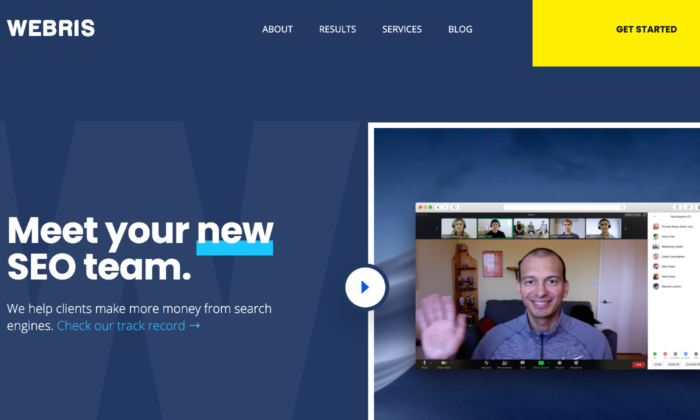
Their entire process is published here, take a look before you decide to contact them.
Led by Ryan Stewart, Webris boasts a talented team of advanced technical SEO experts trusted by government agencies and enterprise companies.
3. Salt.agency – Best for Technical Organic Optimization
Salt.agency’s core differentiator is how they blend industry-leading technical expertise with organic growth strategies to drive organic optimization.
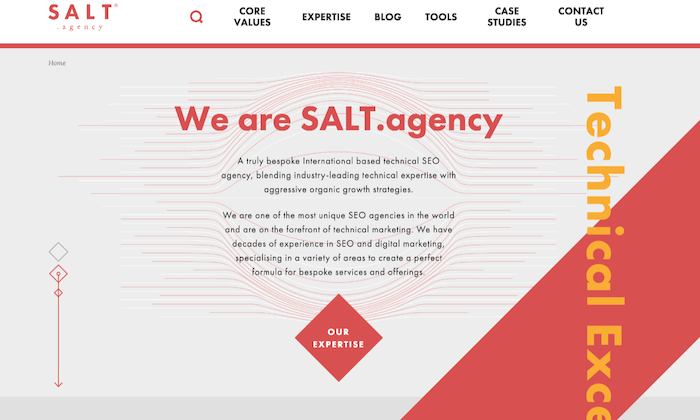
They’re a good option for business that need more than just a technical SEO audit. If you know that you have SEO problems but aren’t sure where they are, they’ll be happy to dig in and give you guidance on your strategy.
They have offices in Leeds, Boston, and London and customers that include Travel Supermarket, Cloudflare, Hartley Botanic, and many others.
4. Ayima – Best for Enterprise Technical SEO
Ayima positions itself as the technical SEO agency for enterprise companies. And this agency’s minimum project size is $25,000.
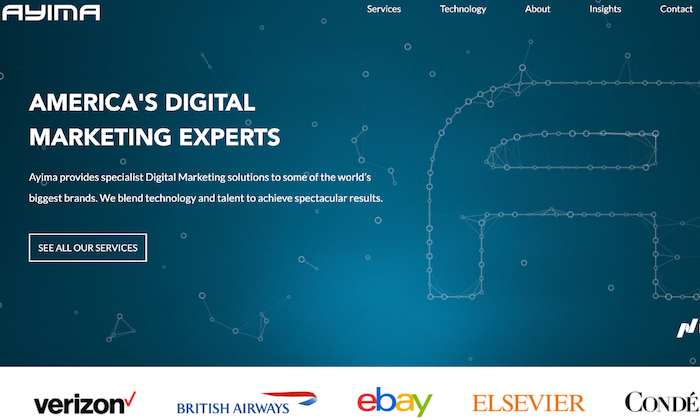
This may seem on the high side from afar, but it only reflects Ayima’s vast experience and expertise, working with huge companies like eBay and British Airways.
Ayima didn’t become the technical SEO agency for enterprise brands overnight. The company earned its stripes after transitioning from a search engine technology startup into a technical marketing agency.
In any space, the best agencies have people that have built products in that exact space. They really understand how it all comes together.
If you’re looking for hardcore technical SEO expertise, reach out to them.
5. Orainti – Best for eCommerce Brands
Orainti, a Spanish-based SEO agency, works mostly with ecommerce brands selling globally.
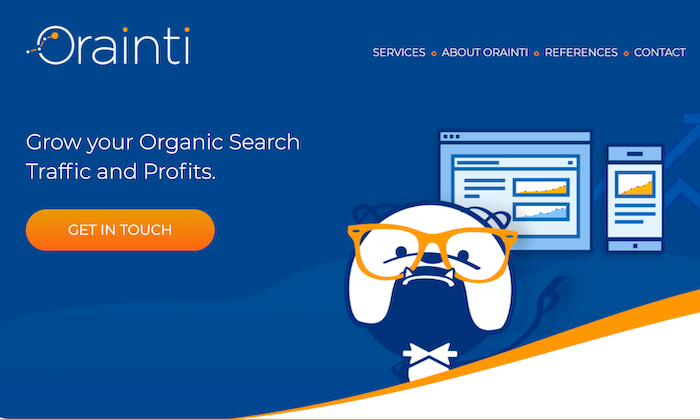
This agency is excellent for developing SEO-optimized multilingual domains and a robust site structure for category pages and products.
Ecommerce sites have a lot of technical SEO problems that are completely unique for them. If you have a large ecommerce site, I’d definitely recommend working with an agency with deep ecommerce experience.
Most importantly, most of Orainti’s services is around technical SEO.
Founded by Aleyda Solis, a veteran SEO practitioner, author, and speaker, Orainti has an impressive portfolio of premium brands likeUnder Armour, Zillow, Sage, Eventbrite, and others.
Have a Plan for Technical SEO from Day One
Most businesses make the mistake of relegating technical SEO to the backseat.
Why?
Because from the onset, it doesn’t have much impact on rankings and traffic.
A little time invested today could gain you thousands of extra visitors without any extra work later.
Don’t wait for things to go south. Make it easy for Google to find, index, understand, and rank your content.
No sense in jumping on the SEO treadmill while trying to carry a bunch of extra weight that will only slow you down.
Get a solid plan for technical SEO from day one.
And if you need help, reach out to an agency that specializes in technical SEO.
The post How to Choose The Right Technical SEO Agency appeared first on Neil Patel.
How to Choose The Right Amazon Marketing Agency
Choosing the right Amazon marketing agency can be the difference between becoming a thriving seller on Amazon or one that flops.
Do you know why I say so?
A pool of more than 2.5 million sellers fights for the attention of Amazon’s customers. Out of this, only 10% generate annual sales of more than $100,000.
Only a few sellers make a great income on the platform.
Are you a seller struggling to attract buyers on Amazon? Would you like to increase your store’s reach and drive more revenues?
By partnering with a top Amazon marketing agency, you can improve the visibility of your store, reach more buyers, and drive sales.
Below, you’ll find my recommended steps on how to choose a top Amazon marketing company to grow your store business on the platform.
Know Your Goals and Desired Outcomes
A marketing agency won’t re-invent your store on Amazon.
They’ll work with you to achieve your goals and realize your business outcomes.
If you, the store owner, fail to define what those goals and outcomes are, how can a marketing agency perform magic and turn you into an overnight success on Amazon?
It doesn’t work that way.
To help you get started, let’s explore some scenarios when you should hire an Amazon marketing agency.
Example #1: Rank your products higher in Amazon search
I’ve already mentioned that Amazon has over 2.5 million sellers.
But that’s nothing close to the number of products vying for your potential customers attention and credit cards on the e-commerce site.
According to Retail Touchpoints, more than 353 million different products for sale on Amazon.
With so many stores and products, your store basically doesn’t exist unless it ranks well in Amazon’s search.
Let’s assume you sell belly button rings and someone goes on Amazon to search for it:

This search term alone produced over 96 different products on Amazon’s first search results page that included about 12 stores.
What if your store isn’t one of them?
Your goal should be to improve Amazon SEO.
The higher your rankings, the more visibility you have with Amazon’s customers. And more visibility equals more sales.
As you see in the screenshot above, an excellent way to achieve this is to ensure your store and product descriptions are optimized with relevant keywords.
Is this why you’re looking for an Amazon marketing agency?
Then, consider one with a battle-tested SEO-driven content marketing program, as both store and product descriptions are forms of well-targeted content creation.
Example #2: Promote your Amazon products on Amazon
Let’s keep using our belly button ring example.
This time, assume you’ve optimized your store and product descriptions, adhering to all Amazon SEO requirements.
Despite this, it’s possible to still have other sellers with similar products on Amazon rank higher than you. You can expect this because Amazon has several ranking factors.
For instance, see the first product listed for the belly button ring we searched earlier:

This product was promoted to the very first position on Amazon search results page. The store spent money to get their ad to the top of the list. It’s pay to play.
That’s why it has a “Sponsored” label.
This scenario shows that you can promote your products on Amazon to reach targeted buyers based on different criteria like search terms, locations, age range, etc.
If this is your goal, the outcome would be to skip the queue and reach potential buyers on Amazon.
Amazon has an entire ad network that you can now access. Like any ad network, it requires a ton of setup and lots of ongoing attention if you want to make a decent profit.
An Amazon marketing agency is ideal for this type of work. You already have your store and products, you just want an experienced team to run your ads for you.
Will an agency add to your total costs instead of running the ads yourself? Yes. But the ads will also perform a lot better. The agency will easily pay for itself.
So if you have either of these two goals, I highly recommend working with an Amazon marketing agency.
So, what characteristics should you look out for when choosing one?
6 Characteristics That Make a Great Amazon Marketing Agency
Below are six characteristics you’ll find in exceptional Amazon marketing agencies.
1. Demonstrated knowledge of the Amazon marketplace
Marketing your store and products on Amazon has its best practices.
It also has its dos and don’ts.
To determine if an Amazon marketing agency knows and puts them into practice, check if they have practical knowledge of how the Amazon marketplace works.
Exceptional Amazon agencies share these best practices in the form of how-to guides and training resources, showing how to drive more sales on Amazon:
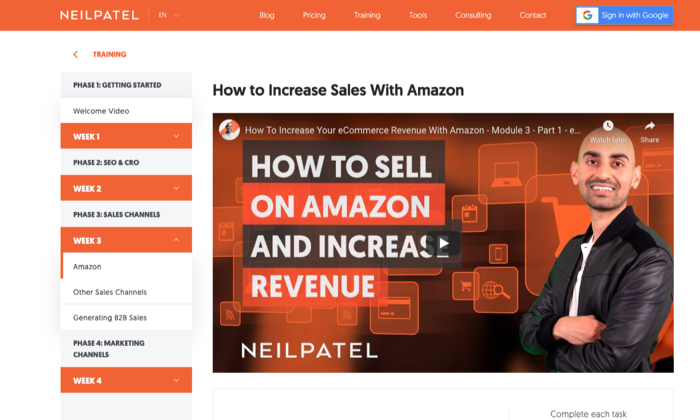
2. A team of experts
Marketing, on its own, won’t do all the heavy lifting required to turn your Amazon store into a thriving business.
Other essential things like proper store setup, products’ listing optimization, brand-specific creatives, PPC management, and others must go into the equation.
And you won’t achieve all that with a one-person team.
Hence, a characteristic of great Amazon marketing agencies is that they work with a diverse team of experts.
3. A process for implementing their core service
In the agency world, a battle-tested process makes all the difference. It’s the only way to deliver reliable results with new clients.
Without a solid process, working with an agency is like rolling the dice. Sometimes it works, sometimes… it doesn’t.
Successful agencies will customize processes based on your unique needs but they should have a solid core with a proven track record.
For my team at Neil Patel Digital, we’ve developed a comprehensive program to help Amazon sellers drive traffic to their stores and product pages.
4. An impressive clients’ portfolio
Before you choose an agency, it’s important to examine who they’ve worked with in the past.
You’ll find this in their clients’ portfolio.
This is also a critical characteristic to check for, as it gives you a sense of the type of companies the agency typically works with.
Great Amazon marketing agencies take it one step by having an impressive portfolio of clients.
5. Great company culture
When choosing an agency, most people omit the company culture of an agency they want to partner with.
You shouldn’t!
Working with an Amazon marketing agency is usually a long-term partnership. If your beliefs are not aligned, you face the possibility of running into problems in the future.
To avoid this, choose an agency with a great company culture with similar values as your own.
6. Customer testimonials
Before you choose an Amazon marketing agency, take a moment to look out for testimonials they’ve received from past and present clients.
This gives you an idea of what people think and feel about their services. It also helps you to see if what the agency offers is worth the fee.
How to Work With an Amazon Marketing Agency
Working with an Amazon marketing agency follows a series of steps. And you should adhere to them to ensure a smooth partnership.
For great agencies, expect go through the following steps:
1. You’ll fill an inquiry form
When you visit the agency’s website, the first step is to fill their inquiry or contact form.
There’s usually forms for basic information about your business.
It’s also the first opportunity to share what your needs are and how you want them to help you.
For any well-run agency, you should hear back from them within 24 hours. If it takes longer than that, proceed with caution.
2. Discovery session
Experienced Amazon marketing agencies will want to do a one-on-one consultation session.
You should expect this, as it gives you the opportunity to share your needs and talk directly with a marketing expert.
3. Research and strategic recommendations
No two business cases are 100% identical.
Great agencies take what you share with them from the first call and perform in depth research to come up with recommendations unique to your Amazon store.
Usually, a second call will get scheduled to go through everything.
4. A Proposal and contract
By going through the recommendations delivered to you by an agency, you’ll gain more clarity if working with them is a good fit.
Right after this, you’ll usually receive a proposal and contract that sets the terms for working together.
5. Official client onboarding
Project management plays a very essential role when working with an Amazon marketing agency.
To ensure both parties have an understanding of who does what and when, excellent agencies would take you through an official client onboarding process.
Over this process, you’ll get to know who is your account manager (the expert overseeing your project) and get a full scope of the project, deliverables, and timelines.
How to Find The Right Amazon Marketing Agency For You
So far, I’ve walked you through the characteristics and steps to working with an Amazon marketing agency.
But one question remains, how do you find an agency that is right for you?
The first step is to always know your goals.
The next step is to choose an agency with expertise in the area you need help with.
To help you, we profiled the top Amazon marketing companies and what they excel most at.
The 5 Top Amazon Marketing Agencies
#1 Neil Patel Digital — Best for Store and Product Content Marketing
With SEO-driven content marketing, you can score higher Amazon SEO points by optimizing your store and product descriptions.
In turn, your store and products will become more discoverable with higher rankings when potential customers search on Amazon, as you saw in the example above.
It’s been ages since you could get away with one good photo and a basic product description. These days, you need a host of professional photos, videos, optimized descriptions and titles, comparison tables, FAQs, and detailed descriptions that address every objection in the market.
This is a core part of the offering at Neil Patel Digital:
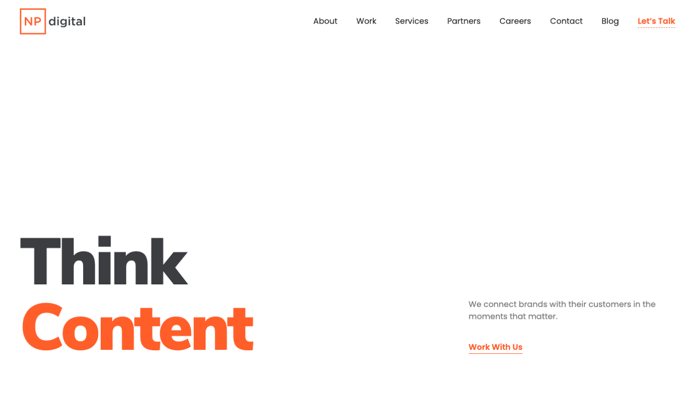
Companies from across the world, from startups to enterprise brands, trust Neil Patel Digital.
#2 Thrive Agency — Best for Amazon PPC
When potential buyers research products or services on Amazon, a whopping 64% of them don’t click beyond the 1st three results.
To get your store and products in those top positions, you may need to use sponsored posts on Amazon.
Another name for this is Amazon PPC.
Thrive Agency is a company with over a decade of experience in this area:
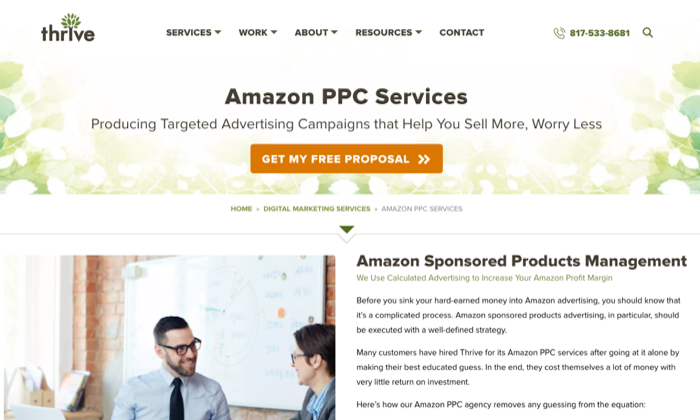
This company has over 150 five-star reviews across Google, Facebook, and Clutch with Amazon-specific case studies.
#3 Vertical Rail — Best for Amazon Account Management
Your Amazon store account health, product deactivations, shipping performance, intellectual property violations, and several others have a direct impact on how well your marketing performs on Amazon.
Vertical Rail is the agency I recommend to ensure you’re 100% compliant on Amazon and reach your marketing goals:
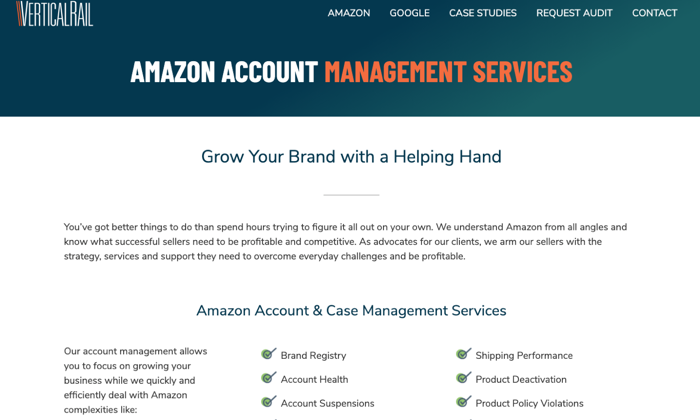
This agency has great case studies on how to run your Amazon store more efficiently.
#4 Voice SEO – Best for Amazon Echo and Voice Search Optimization
In the US, more than 111 million people used a voice-assisted device. And two-thirds of consumers with voice-enabled devices said they considered using them to place orders.
This trend could be the next big marketing opportunity. And with big marketing opportunities like this, you can make a bundle if you get in early.
Voice SEO is the agency you can turn to for this:
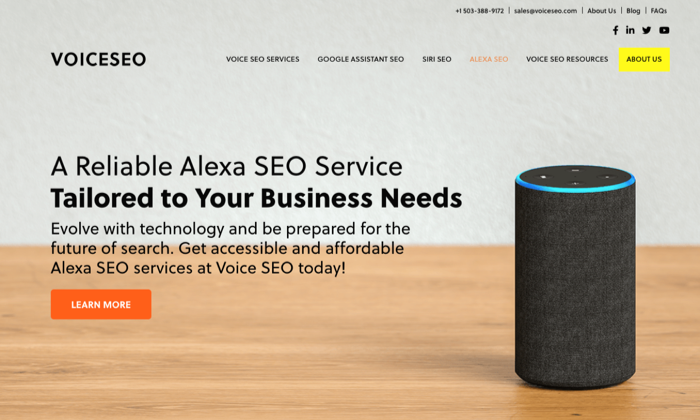
TopSEOs, an agency ranking domain, ranked Voice SEO as its number one company for voice search optimization, and they have accreditations to demonstrate their expertise.
#5 Voy Media – Best for Amazon Social Media Marketing
Most successful Amazon sellers turn to social media to engage their target audience with the ultimate goal of driving traffic to their store and product pages.
If you want to take advantage of social media to drive sales for your Amazon store, Voy Media is great for that:
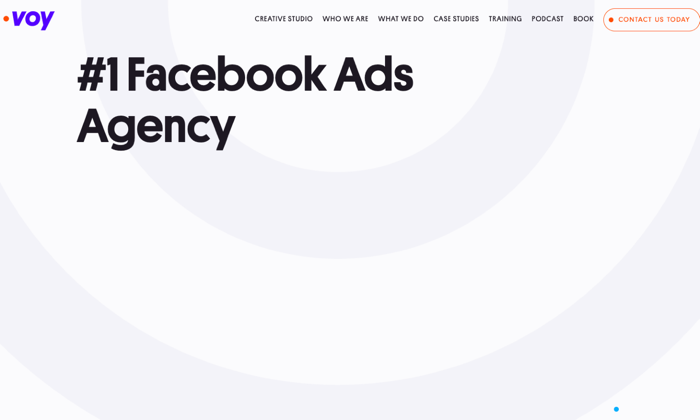
This agency combines strategy and creativity to help Amazon sellers drive sales on Amazon via various social media platforms.
Do You Really Need to Hire An Amazon Marketing Agency?
Yes, and I’ll tell you why.
To give your business a chance, standout from the crowd, and get found on Amazon when potential customers search for things you sell, you’ll need marketing.
And that’s where hiring an Amazon marketing agency comes in.
Whether you want higher rankings or want to run profitable Amazon PPC ads, get an expert that knows what they’re doing. There’s too much competition on Amazon to do it all yourself.
The post How to Choose The Right Amazon Marketing Agency appeared first on Neil Patel.
How to Choose The Right Marketing Automation Agency
If you visit the websites of Salesforce, Marketo, HubSpot other top marketing automation tools, what would you see?
Lofty promises to grow revenue, get more leads, and make your prospects happier.
I wish it was that simple.
These tools have a ton of power but no one gets that benefit right after they sign up. It takes a ton of work to set up and manage these tools correctly.
Having the right agency to help you wield that power to set up a lead generation machine for your business.
Choosing the right marketing automation agency partner will save you a ton of time and get you a lot more leads.
That’s exactly what I’ll walk you through in this article.
So how do you know if a marketing automation agency is a good idea?
Know Your Goals & Desired Outcomes
One of the best ways to avoid marketing automation failures is to plan ahead of time.
What do you want to achieve with marketing automation?
By setting a good goal, you’ll have a much easier time picking the right agency. And they’ll be more successful.
Let’s explore some examples.
Example #1: Get the right content to the right people
Imagine for a moment that you visit the pricing page of a software product after clicking through from a content piece sent to you via email.
Five minutes in, you’re scrolling through the various pricing tiers, not sure what plan to purchase.
Still confused and undecided, you decide to take your leave. But just when you wanted to exit the page, a pop-up covers the pricing page.
It has a message that reads:
“Don’t know which plan to choose? Read our FREE guide on what each plan gets you.”
You go ahead and open the guide, read it, and finally decide on what plan to choose. However, other events take your time and you forget to complete your purchase at that time.
The next day, you receive an email notification from that company. It reads:
“Hey [insert your name], ready to choose a plan now? See how [a competitor in your same industry] used our tool to increase sales by 31%.”
You loved what you read, and go on to finally make that purchase.
That’s an example of marketing automation using great content to pull people down the funnel instead of pushing them.
At each step, the exact right content hits the prospect at the exact right time. And it happens automatically without anyone of your team triggering it.
Setting up campaigns like this can have a dramatic impact on moving prospects down your funnel.
Example #2: Keeping your data clean for consistent follow-up
Let’s say your business keeps growing.
Now you’re getting leads from everywhere. Phone calls, email, demo request forms, social media, events, partners, it goes on and on.
Even worse, leads from the same company start coming in on different places.
Without the right tool and data management, different sales reps will follow up with different people. That’s a recipe for losing a deal unless your team stays coordinated.
The right marketing automation tool with the right setup will help you maintain control. It’s the only way to keep your close rates high.
But even when you know what you’re after, you’ll still find dozens of agencies vying for your business.
So, what characteristics should you look out for when choosing one?
6 Characteristics That Make a Great Marketing Automation Agency
1. Do they have an area of specialization?
Exceptional marketing automation agencies usually have an area of expertise.
As you saw in the second example above, some only partner with companies to install, implement, or optimize automation on Marketo Cloud, Salesforce, and others.
Others can hack different tech stacks together for companies on a budget.
You’ll also find some specializing in training and working closely with in-house marketing teams to achieve set marketing automation goals.
Who you choose to work with depends on your needs, so an essential characteristic to look out for is whether the agency specializes in that area.
For instance, at Neil Patel Digital, content marketing drives our automation programs.
We start by getting the engaging content to the right people at the right time.
2. Do they have in-house, diversified experts?
Marketing automation requires a ton of different skills in order to do right.
At the very least, you’ll need:
- Deep experience with the tools themselves
- Lead generation
- Copywriting
- Content marketing
- Specific channel expertise (social, events, paid, SEO, etc)
- Sales operations knowledge for smooth handoffs
- Funnel design
- Lead nurturing
And that’s just the beginning. Whoever you’re working with, make sure they have strong enough skills in all these areas.
3. Do they offer relevant, related services?
Marketing automation isn’t a growth silver bullet.
It makes a huge impact when it plugs seamlessly into all your other marketing channels and campaigns.
If you really need serious results from your marketing automation, I’d look at agencies that have deep experience beyond marketing automation itself.
Take my agency, Neil Patel Digital, for instance.
Although we help clients with marketing automation, we offer related services like programmatic marketing, data analytics, and others. In addition to the core marketing services you’d expect from a top-tier online marketing agency.
Why is this helpful?
Getting your entire funnel and brand to work consistently across every touchpoint has massive leverage.
4. Do they have clients’ portfolio(s)?
This one needs no explanation.
All experienced marketing automation agencies have a host of past and existing clients in their portfolio.
Look for similar clients to yourself in order to decide whether the agency is a good fit.
5. Do they have real customer testimonials?
How past clients feel about working with a marketing automation agency is an essential characteristic to look for before you partner with one.
And you’ll find this in their customer testimonials.
Just by going through the testimonials and case studies on an agency’s site, you can tell if they’re worth the fee.
6. Do they have a great company culture?
Most companies omit this characteristic when ticking the criteria for choosing an agency of any kind.
You shouldn’t!
It is important that you work with an agency whose company culture aligns with your business values, as most marketing automation partnerships are usually long-term.
This ensures that the marketing automation systems, funnels, and campaigns will align with the way you do business. Then you won’t have to rip everything out later.
When marketing agency projects truly fail, it’s usually a culture mismatch with the client.
How to work with a Marketing Automation Company
Let’s look at the steps you can take to ensure a smooth working relationship with any agency you choose.
1. Filling an inquiry form
Filling an inquiry form is usually the first step towards showing your interest to work with a marketing automation agency.
It’s usually really easy to find on the agency’s website.
2. Prepare for a discovery call
Expect the discovery call to be much more detailed than calls for other marketing projects.
Marketing automation serves as the backbone to your lead funnel. It touches every campaign, multiple divisions in your company, and isn’t easy to see form the outside.
So any good marketing automation agency will want to spend a lot of time here to understand where you’re currently at.
Only then will they have any chance at helping you get to your future goals.
3. Expect unique, strategic recommendations
Excellent marketing automation companies take what you told them when filling their inquiry form and over the discovery call as the foundation for conducting further research.
The goal of this research is usually to gain more clarity about your needs and to make strategic marketing automation recommendations unique to your needs.
Most companies would send these recommendations via email or hop on another call to discuss it over with you.
4. A proposal or work contract
Followed by the unique, strategic MA recommendations you should expect in the process of partnering with an agency is a proposal or contract.
This document outlines and details what your company would get working with them. It also states the cost implications and other requirements for working together.
5. Official client onboarding
A lot of mutual understanding is needed to ensure you get the most out of a working relationship with a marketing automation agency.
You may need to invest in tech stacks, re-examine your business and marketing strategy, or retrain your staff.
To ensure both parties are aligned on the job to be done and the responsibilities each party must perform to ensure everything works out well, prepare your team for an official client onboarding.
What You Get From a Great Right Marketing Automation Agency
When you choose a marketing automation agency, you’ll:
- Align your marketing processes with your marketing strategy
- Pick the right marketing tech stack
- Generate more leads and move leads down your funnel more efficiently
- Have the data you need to optimize your funnel for better conversions
The 5 Best Marketing Automation Companies
We reviewed and profiled the top marketing automation companies based on their areas of specialization.
#1 Neil Patel Digital – Best for Content Marketing Automation
A core goal of marketing automation is to deliver the right content to the right people just when they need it, whether that is on social media or email sequence.
Irrespective of your MA set up, content is the foundation for so many parts of your funnel. At every stage, buyers are looking for helpful content in order to make better decisions.
Not only must you create excellent content, you also need to deliver the right content to the right person at the right time..
For my team at Neil Patel Digital, that’s our specialty:

As you know, I practice what I preach.
I’ve built and managed enormous content machines for countless businesses over the years. And the majority of them have been automated. My team and I know exactly how to get the most out of every piece of content for every step of a funnel.
AYou can talk to my team about content marketing automation here.
#2 LeadMD – Best for Tech Stack Integration
For marketing automation to free you and your team from mundane tasks, you must integrate the right tech stack.
And this is one area LeadMD comes highly recommended due to their expertise of setting up complicated marketing infrastructure and aligning it to your strategy,
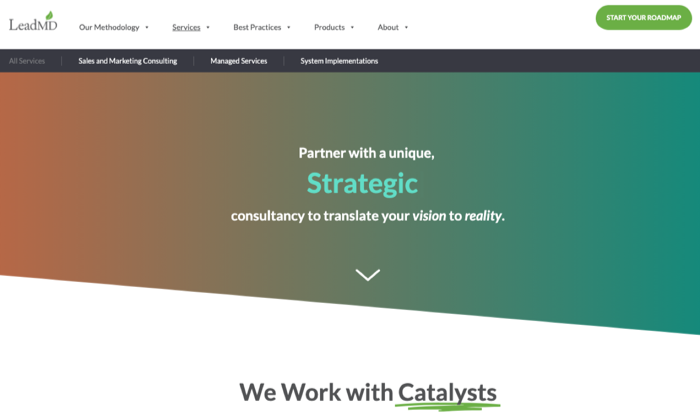
.
LeadMD is one of the most reputable marketing automation companies. And their integration expertise has earned clients like IBM and eBay.
#3 CS2 Marketing – Best for Marketing Data Operations
Cs2 Marketing earns its place on our top list of marketing automation because of its experience, leveraging the power of data to power essential automated marketing campaigns.
And dozens of the top tech brands trust CS2 Marketing for its expertise, using data operations to drive automated marketing processes and business.
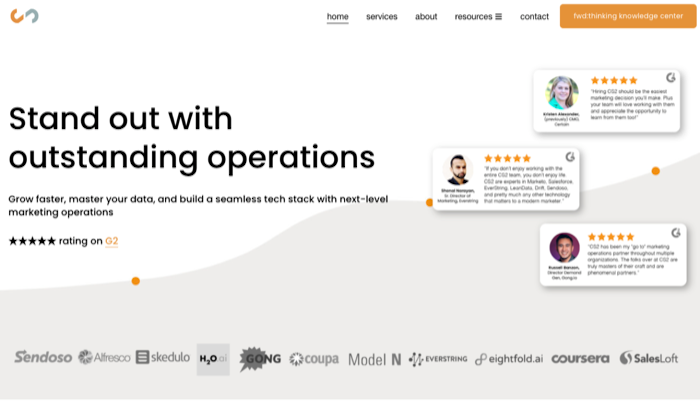
CS2 Marketing has generated more than $1 billion in pipeline revenue for its clients.
#4 Bluewolf – Best for Salesforce Automation
Bluewolf is our recommended marketing automation agency for marketing automation on Salesforce:
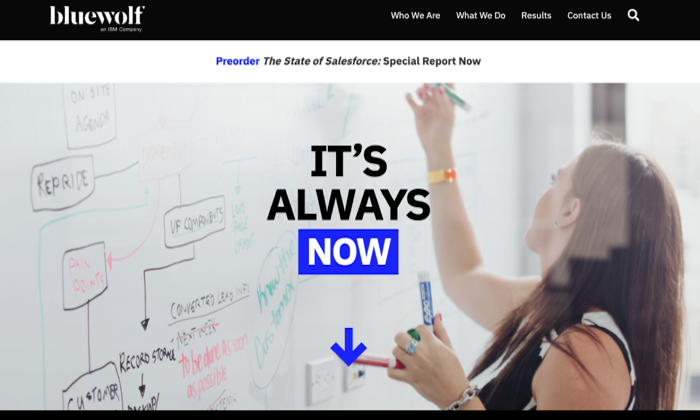
Marketing automation isn’t just about your MA tool, everything has to work perfectly with your CRM. You’ll need experts that know how to integrate the two.
Bluewolf’s clients include T-Mobile, IBM, Autodesk, and others.
#5 Perkuto – Best for Marketo Automation
Perkuto is the leading agency for Marketo. If you need to get ultra fancy with your Marketo implementation, reach out to them.
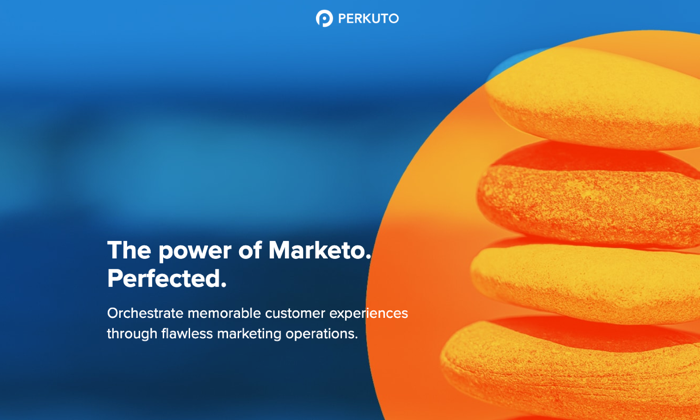
Perkuto’s team of over 50 automation strategists, marketers, and hardcore engineers help companies make the most of their Marketo implementation.
Reach out to specialists like Perkuto if:
- You have an extremely complicated funnel to implement
- Internal teams or agencies have botched a previous install that you need to untangle
- Other agencies have previously failed at wrangling your funnels
What’s most important when choosing a marketing automation agency?
It depends on your needs.
Do you need help implementing or optimizing your marketing automation tech stack?
Choose an agency with experience in working with your tech stack of choice.
Do you have challenges making sense of your marketing touchpoints?
Then go with a marketing automation agency specializing in data operations.
Do you want to get the absolute best ROI from every dollar invested into marketing automation?
Then work with an agency that has deep experience across marketing channels, knows how to get the entire marketing funnel working together, and will use marketing automation to accelerate the marketing KPIs for your entire company.
The post How to Choose The Right Marketing Automation Agency appeared first on Neil Patel.
How to Choose The Right Analytics Agency
In our modern digitally enhanced world, data and information underpin all of our activities. But are you making your data work for you, or is it something that you are yet to take full advantage of? For many business owners and marketers, analyzing and deploying data can be an intimidating prospect. For that reason, analytics …
The post How to Choose The Right Analytics Agency first appeared on Online Web Store Site.
How to Choose The Right Digital Strategy Agency
According to a recent survey from the DMEXCO, 70 percent of executives worldwide expect the pandemic to accelerate the pace of digital strategy. In the past, businesses had more time to plan and prepare.
That’s no longer the case.
Today, businesses are expected to outline, plan, implement the digital strategy in a matter of days or weeks. The market is moving at an accelerated pace; many businesses find they’re unable to keep up. If you can’t keep up, does that mean you’ll be left behind?
Not if you have the right digital strategy agency.
With the right agency, you’ll be able to adapt to rapidly changing circumstances and events. Here are some steps you can take to find and vet the right agency.
Know your goals and desired outcomes
Identifying your digital strategy is the key to long-term growth.
Your digital strategy is about setting goals and objectives. It’s a high-level overview that defines where you are now, outlines where you’d like to go (as an organization), and how you’ll get there. It’s a long(er) term plan that sets a course or destination for you to follow before starting your journey.
You’re going to need a list of:
- Goals, KPIs, and objectives: For example, you could focus your attention on generating a specific number of leads, customers, or revenue. You’re running a SaaS business, focus your attention on reducing churn and increasing MRR.
- Target audience members: It would be best if you had a clear idea of the specific customer segments you’re looking to target. Your agency should help you with the demographics, psychographics, and ethnographics if you need help clarifying your audience.
- Customer hangouts: You’ll want to identify your customer hangouts and the places online where your customers spend their time. This will help you identify potential partners, advertising opportunities, and strategic alliances you can use to grow.
- Obstacles and challenges: You’ll want to outline the list of barriers and challenges that may prevent you from achieving the goals and objectives you’ve listed above.
- Competitors and key players: You’ll want to identify your competitors and their strengths and weaknesses. This reduces direct competition, making it easier for you to attract customers based on your strengths and the areas you perform best.
- Strengths and weaknesses: Point out the areas where you have an advantage in your market or where you’re most vulnerable. Your agency should be able to provide you with options to address each of these, so you’re able to outperform your competitors.
If you have clear answers to these questions, it’s easier for your agency to supply you with the strategy you need to be effective.
3 Characteristics That Make a Great Agency
Great agencies have a few characteristics in common. They’re able to focus their attention on the details that matter to your company and your customers.
1. They ask probing questions
Your agency can’t create the right digital strategy for your company if they don’t have the answers they need. A great agency asks probing questions that may seem simple, dumb, or unimportant at first. You want your agency to ask these questions because these questions help them to develop an in-depth understanding of your business.
Here are a few examples.
- What are your current benchmarks?
- What are your goals and objectives for your business overall? For each segment?
- Which KPIs or metrics are you using to measure performance?
- What do customers expect from your business?
- Where do your customers spend their time online?
- Which marketing channels work best to attract customers?
- What tactics should we use to achieve our goals and objectives?
Questions form the basis of your digital strategy; your digital strategy shows you where you are now, tells you where you’re going, and how to get there. Good digital marketing agencies should be asking these questions at the beginning of the engagement process.
2. Ask your agency to give their strategy away
Your agency should be willing to share bits and pieces, showing you what a cohesive strategy could look like for you. This is important because it gives you several data points you can use to evaluate their work. This doesn’t mean that you should expect your agency to work for free; it just means they’re willing to demonstrate their skills.
Your agency can share this with you in several ways, over the phone, in your proposal or quote, or a case study. You’re looking for them to share pieces of their proposed digital strategy or examples from previous campaigns they’ve implemented for other clients.
- Request performance data from your agency
- Use performance data to evaluate their performance
- Pay attention to the campaign elements they prioritize consistently
- Look for knowledge gaps, holes in their strategy, or weak points
- Discuss the details you’ve noticed with them during the interview process
Another option would be to pick one part of your business (e.g., content or advertising) and ask your agency how they’d build a strategy to accommodate one specific goal (i.e., how would you increase sales for my worst performing products using content marketing?).
3. Your agency knows how to implement
Digital strategy is important, but it’s not as important as the ability to execute that strategy. A great strategy isn’t enough. Your agency should have the experience, skill sets, and team you need to implement your digital strategy and produce the results you need to grow.
You’re looking for three things.
- An agency that can create a comprehensive digital strategy that works with your existing marketing plan
- An agency that knows how to implement your digital strategy successfully
- A proven track record showing that they’ve achieved this for other clients in the past
Your agency should provide you all three of these, and they should be able to provide you with evidence showing that they offered other clients these as well.
How to Work with a Digital Strategy Agency
As you’d expect with any other agency, you’ll want to see a list of samples, references, case studies, and reviews showing that they’re legitimate and competent.
Ask your clients to provide you with a list of milestones and campaign deliverables. You’re looking for a clear timeline that projects how long everything will take to implement, and when they anticipate, you’ll begin seeing results. Your plan should include details on:
- Media advertising: This includes commercials on tv or streaming services, as well as app, radio, podcasting, and sponsorship spots. This won’t be relevant for some, but it’s still something your agency should be able to support if you need it.
- Public relations: What will your agency do to generate press for your business? What strategies will they use to increase visibility and publicity for your business?
- Digital marketing: This encompasses everything from local search, organic search engine optimization, content marketing, advertising,
- Direct response: This can include tactics like geofencing or hyperlocal print advertising; it’s a direct response option that’s designed to integrate with your overall strategy. This is especially important for local businesses that operate in a specific market.
- Partnerships: These partnerships can include tactics like JV partnerships, strategic alliances, or channel partnerships. These pieces are essential and should be an important part of your digital strategy.
Your agency should be able to show you how they plan on approaching your campaign or project. Ask them to break down the approach that goes into their strategy documents; this document should clarify how they’ll approach your campaign, what you should expect, what their goals are, and more.
You’ll want to provide your agency with the following:
- Agreements. It’s common sense, but it’s also something many clients ignore. Take some time to look over their agreement; look for red flags and trouble spots with legal before you sign.
- Brand content. Gather all of your content, brochures, flyers, guides, promos, images, logos, style guides, and marketing materials for your agency.
- Photos. Give your agency access to all relevant photography — company photos, portraits/photos of key people, office space, location, general and event photos, etc.).
- Accolades. Make a list of the social proof your company has — awards, recognition, testimonials, praise, positive reviews, or feedback you’ve received. Give your agency with the assets and resources needed if they ask.
The digital strategy company you choose will provide you with a list of items they need and the options you need to implement their plan successfully.
How to Find the Right Digital Strategy Agency For You
You can use directories like Clutch.co, HubSpot Agency Directory, or Sortlist to find the right digital strategy agency that’s best for you. Here’s a list of some of the best in the industry. You can go through the traditional RFP process or you can simply request a quote.
The 6 Top Digital Strategy Agencies
Here’s a list of six of the top digital strategy agencies online.
1. Neil Patel Digital — Best For Content Marketing & Digital Strategy
I’ve created more than 4,294 blog posts in 10 years. I’ve written millions of words, and I’ve used content marketing to build three companies of my own generating 195,013 visitors a month. I did the same things for large fortune 500 clients; now I can do that for your business too.
2. REQ – Best for Enterprise Business Strategy
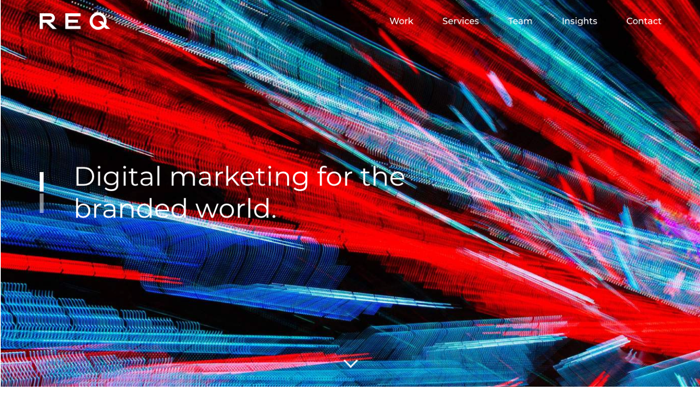
REQ is an award-winning agency with enterprise-level expertise. They’re industry veterans with some of the best talents in the business. They’re part of the Inc.500 and Deloitte Fast 500 lists – they’re one of the fastest-growing companies in America.
3. Usman Group – Best for Mid-market Business Strategy
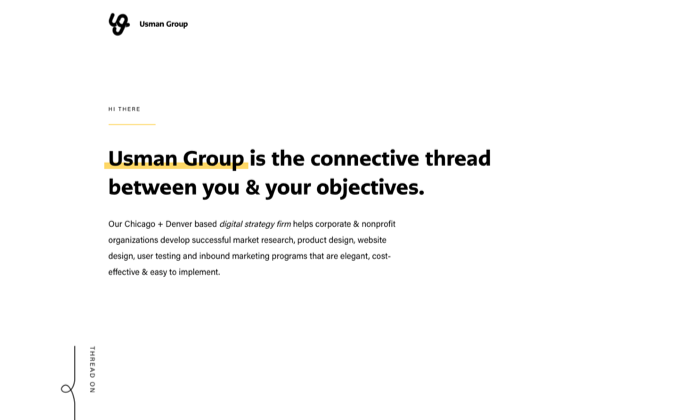
With 80% of its clients in the mid-market range, earning between 10M – 1B, the Usman Group, specializes in digital strategy and market research. Their agency is oriented around design thinking; they produce projects that are evidence-driven, practical, and focused on research.
4. DeSantis Breindel – Best for Branding Strategy
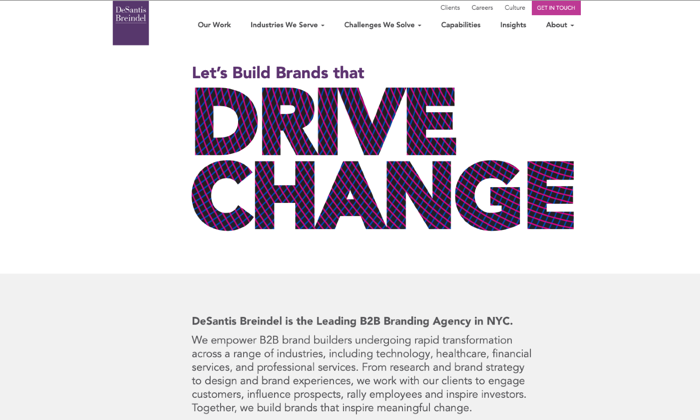
DeSantis Breindel is a digital strategy company that specializes in end-to-end branding strategy. They’re focused on all things branding — they serve businesses via brand differentiation, brand valuation, brand launches, and employee engagement and more.
If your company relies on image and brand reputation, DeSantis may be a good fit.
5. Mabbly – Best for Data Analysis, Channel Strategy
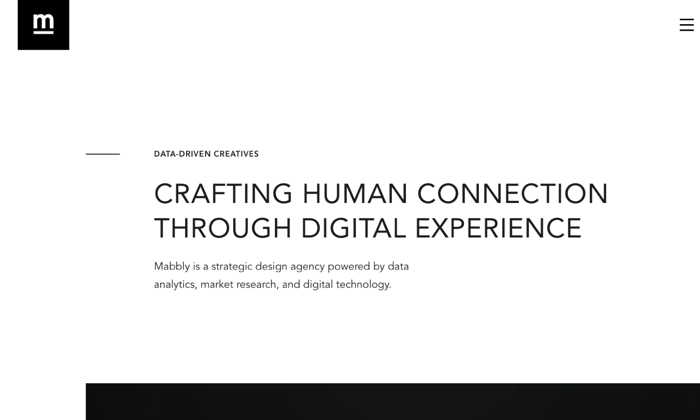
As a digital strategy firm, Mabbly emphasizes market research and data analytics. They specialize in converting large and complex problems into growth opportunities for established and up and coming brands. Their starting price is slightly higher but worth the investment if you’re looking for a data-driven approach.
6. Ironpaper – Best for Small Business
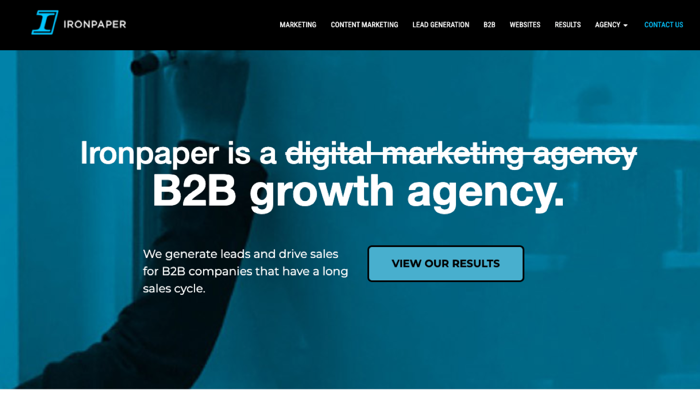
Ironpaper bills itself as a B2B growth agency. As a digital strategy firm, their conversion growth strategy focuses on gaining traction with growth up to 1 percent. The growth phase starts at 1 to 3 percent, with anything above 3 percent listed as scaling.
Conclusion
Businesses have less time to adjust; now, more than ever before, customers are expecting companies to meet their expectations and needs immediately. Digital strategies that played out over the course of one to three-year cycle now finish in a matter of days or weeks. Business is accelerating as customers move more of their business online.
Most companies will need help to keep up.
If you have the right digital strategy agency, you’ll have the support you need to adapt to a rapidly changing market and events. Use this guide to find and vet the right agency for your business.
The post How to Choose The Right Digital Strategy Agency appeared first on Neil Patel.
How to Get a Commercial Line of Credit Right Now
Covid-19 has turned the world topsy turvy. There is no way around it. Most businesses need a little extra financial cushion at the very least. Most need much more than that. What happens in this post COVID-19 economy is literally unfolding as we watch. A commercial line of credit could be just the thing to keep your business going during a recession.
Get a Commercial Line of Credit Fast
The thing is, most business owners need money right now. That means you need the fastest, most cost-effective commercial line of credit that you can get. Why a line of credit rather than a loan? There are a few reasons, but one main reason.
Commercial Line of Credit vs. Loan
The most basic definition of a commercial line of credit is that it is a revolving credit, similar to a credit card. You have a limit and continuous access to that limit while making payments only on the portion you use each month.
For example, if you have a $10,000 line of credit, you can use however much of those funds you need each month for whatever you want, unless your lender issues some sort of restriction. If you use $2,000, then when you get your statement you will have to pay $2,000 plus the interest, rather than a payment plus interest on the entire amount of the loan.
If you were to pay $1,000, then spend another $500, you would pay on the $1,500 balance the next month. Your payments change as your balance changes. Just like with a credit card.
What is the advantage of a line of credit over a term loan? Flexibility, hands down. With a line of credit, you do not have to repay or pay interest on any amount that you do not use. You have access to the funds as needed, but you do not have to repay the entire amount unless you use the entire amount.
Credit Line Hybrid Financing: Get up to $150,000 in financing so your business can thrive.
Commercial Line of Credit vs. Credit Cards
Now, you’re probably thinking that credit cards are super easy to get, and they work the same way. It’s revolving credit. You only use what you need. You only pay back what you need.
Why is one better than the other? In some cases, a credit card may be the better option. This is a choice to make based on several different factors.
The main difference between the two that most borrowers need to know is that a line of credit typically has a lower consistent interest rate. However, there are no perks like 0% interest or cash back that you sometimes see with credit cards.
Another benefit with a credit card is that it is typically unsecured credit, meaning you do not have to have collateral. Many credit lines do require security, or collateral.
Middle Ground: Credit Line Hybrid
There is middle ground between unsecured and secured credit, and between a commercial credit line and credit cards. It’s called a credit line hybrid. A credit line hybrid is revolving, unsecured financing that allows you to fund your business without putting up collateral, and you only pay back what you use. It’s quickly accessible, lower interest, and high limit. It’s the best of both worlds.
Who Qualifies for this Type of Commercial Line of Credit?
Who qualifies for a credit line hybrid? Well, if you have a personal credit score of at least 685, you’re off to a good start. In addition, you can’t have any liens, judgments, bankruptcies or late payments. Furthermore, in the past 6 months you should have less than 5 credit inquiries, and you should have less than a 45% balance on all business and personal credit cards. It’s also preferred that you have established business credit as well as personal credit.
If you do not meet all of the requirements, it’s okay. You can take on a credit partner that meets each of these requirements. Many business owners work with a friend or relative to fund their business. If a relative or a friend meets all of these requirements, they can partner with you to allow you to tap into their credit to access funding.
What are the Benefits of This Type of Commercial Line of Credit?
There are many benefits to using a credit line hybrid. First, as already mentioned, it is unsecured. That means you do not have to have any collateral to put up. Next, the funding is “no-doc.” You do not have to provide any bank statements or financials.
Not only that, but typically approval is up to 5x that of the highest credit limit on the personal credit report. Furthermore, frequently you can get interest rates as low as 0% for the first few months, allowing you to put that savings back into your business.
The process is pretty fast, especially with a qualified expert to walk you through it. One other benefit is this. With the approval for multiple credit cards, competition is created. That means it’s likely if you handle the credit responsibly, that you can get interest rates lowered and limits raised every few months.
Private Lenders: Another Way to Get a Commercial Line of Credit Fast
Private lenders generally operate online. They typically offer lines of credit to those with credit scores that are lower than what is generally required by traditional banks. In addition, often you can get the funds within a few days of application, rather than a few weeks. Here are a few examples.
Kabbage
Kabbage offers a credit line of up to $150,000 with no credit score required. The catch is that the interest rate is between 32 and 108%. The business must have been in existence for at least one year and have revenue of at least $50,000.
Due to the extremely high interest rate, this is really only an option for those businesses that cannot get financing due to a low or nonexistent credit score and need something immediately.
StreetShares
The credit line that StreetShares offers goes up to $100,000 for those who have a business credit score of at least 600. You also have to have been in business for at least one year, and have at least $25,000 in revenue. It requires weekly repayment.
This is a good option for smaller businesses that are okay in the credit department but have trouble meeting higher revenue criteria. Also, the interest rate minimum is lower than some. The low end at 9%.
OnDeck
If you have a credit score of at least 600 you can get a credit line of up to $100,000 with OnDeck . The interest rate is a little higher than some that require a higher credit score minimum. It ranges from 13.99 to 39.99 percent.
Again, due to the higher interest rate, this should only be an option if you cannot meet the higher credit score requirement with a lender that offers a lower interest rate.
Credit Line Hybrid Financing: Get up to $150,000 in financing so your business can thrive.
Lending Club
The credit line at Lending Club goes up to $300,000. It requires a credit score of 600, at least one year in business, and $50,000 or more in revenue. The repayment term is 25 months. In addition, they require collateral for limits over $100,000.
This is a good option for those who meet the requirement as there is a higher limit available with collateral, and the interest rate can go as low as 6.25%. Also, the repayment terms are more manageable.
Credit Card Options
Of course, while not the perfect solution, credit cards are an option. You have to be careful, and you want to research to ensure you get the best rates and terms possible. Here are some to start with.
Brex Card for Startups
The Brex Card has no yearly fee. Also, you will not need a personal guarantee. However, this card does not work for every industry.
To determine creditworthiness, Brex checks a company’s cash balance, spending patterns, and investors. Rewards include 7x points on rideshare and 4x on Brex Travel. Also, you can get triple points on restaurants and get double points on recurring software payments. Get 1x points on everything else.
Capital One® Spark® Classic for Business
The Capital One® Spark® Classic for Business is another good one to consider. It has no annual fee, but there is also no introductory APR offer. The regular APR is a variable 24.49%. However, you can get unlimited 1% cash back on every purchase for your company and there is no minimum to redeem.
While this card is within reach if you have fair credit scores, beware of the APR. If you can pay promptly, and completely, it’s a good deal.
Ink Business Unlimited℠ Credit Card
The Ink Business Unlimited℠ Credit Card has no annual fee and a 0% introductory APR. After that expires, the APR is a variable 14.74 to 20.74%.
Earn unlimited 1.5% cash back rewards on every purchase made for your company and get $500 bonus cash back after spending $3,000 in the initial 3 months from account opening. Rewards rewards for cash back, gift cards, travel and more using Chase Ultimate Rewards®. You will need superb credit to get approval for this card.
Blue Business® Plus Credit Card from American Express
The Blue Business® Plus Credit Card from American Express has no no annual fee and either, and it also has a 0% introductory APR for the first year. After that, the APR is a variable 14.74 to 20.74%.
Get double Membership Rewards® points on everyday business purchases like office supplies or client dinners. This applies to the first $50,000 spent each year. You get 1 point per dollar after that. Your credit has to be really good to qualify.
American Express® Blue Business Cash Card
Another one to check out is the American Express® Blue Business Cash Card. It is identical to the Blue Business® Plus Credit Card from American Express. However its rewards are in cash instead of points. You get 2% cash back on all eligible purchases up to $50,000 per calendar year. After that, it’s 1%.
There is no yearly fee, and there is a 0% introductory APR for the first one year. Afterwards, the APR is a variable 14.74 to 20.74%. You will need awesome credit to qualify for this card.
Credit Line Hybrid Financing: Get up to $150,000 in financing so your business can thrive.
Capital One ® Spark® Cash for Business
The Capital One® Spark® Cash for Business card is another great option. It has an introductory $0 annual fee for the first year. After that, it costs $95 per year. There is no introductory APR deal. The regular APR is a variable 18.49%.
You can get a $500 one-time cash bonus after spending $4,000 in the first 3 months from account opening. Also, you get unlimited 2% cash back. YOu can rRedeem any time without any minimums. You will need fabulous credit scores to qualify.
Discover it® Business Card
Another good one is the Discover it® Business Card. It has no yearly fee. There is an introductory APR of 0% on purchases for twelve months. Then, the regular APR is a variable 14.49 to 22.49%.
You get unlimited 1.5% cash back on all purchases, with no category restrictions or bonuses. Also, they double the 1.5% Cashback Match™ at the end of the first year. There is no minimum spend requirement either.
You can download transactions easily to Quicken, QuickBooks, and Excel. This one also requires great credit scores.
The thing with credit cards is, you have to be so careful. As with all debt, payments must be made on time. However, the higher interest rates make this a little harder than it typically is with a commercial line of credit.
A Commercial Line of Credit Can Help You Right Now
In this post COVID world, most business owners need money fast. A commercial line of credit is the best way for that to happen, especially if you can get a credit line hybrid. Truly, with the ability to use a credit partner, virtually everyone can access this type of funding. It’s low interest, high limit, fast access to the funds you need to make sure your business thrives regardless of the state of the economy.
The post How to Get a Commercial Line of Credit Right Now appeared first on Credit Suite.
How to Get a Commercial Line of Credit Right Now
Covid-19 has turned the world topsy turvy. There is no way around it. Most businesses need a little extra financial cushion at the very least. Most need much more than that. What happens in this post COVID-19 economy is literally unfolding as we watch. A commercial line of credit could be just the thing to … Continue reading How to Get a Commercial Line of Credit Right Now
How to Choose The Right Content Marketing Agency
Content marketers who blog regularly receive 55 percent more website visitors and 67 percent more leads than those who don’t. Organizations that prioritize content marketing receive 13X more ROI than those that don’t.
It’s no secret that content marketing works.
What’s difficult is showing up day after day, with fresh content your readers find educational and valuable. After a while, the content marketing arms race can become a grind. If you have the right content marketing agency, growth is easier. It’s simple to create content that’s focused, helpful, and profitable.
Know your content marketing goals and desired outcomes
Research from the Content Marketing Institute shows 80 percent of B2B marketers use metrics to measure their content performance, 65 percent have set KPIs, and 43 percent measure their content marketing ROI.
Do you?
If you’re not sure about your goals and desired outcomes, content marketing can become an expensive black hole. Successful content marketing starts with setting goals and objectives. The metrics and KPIs you use depends on a few different factors — the size and location of your business, your industry, and your circumstances. Here’s a list of the top six metrics marketers have used to measure their content marketing performance in the last 12 months.
- Email engagement (e.g., opens, clicks, downloads)
- Website traffic (e.g., page views, unique visitors, backlinks, conversions)
- Social media metrics (e.g., shares, follows, views, likes)
- Conversions (e.g., traffic to leads, traffic to subscribers, leads to sales)
- Subscriber counts (e.g., # of follows, growth, unsubscribes)
- Search rankings
What should your goals and desired outcomes be?
When it comes to content marketing, there really isn’t a shortage of metrics. If you wanted to, you could track 50+ metrics around your business. That’s not helpful if you’re focused on vanity metrics that don’t help you grow. You’ll probably want to focus your attention on the metrics that are directly tied to your revenue.
This is why goals and outcomes are so important.
If you’re aware of the goals and outcomes you want, you have a better sense of the metrics you need to track. These metrics show you whether you’re getting close to your goal or not.
Here’s an example.
If you’re running a SaaS business, you’d be focused on improving the five must-have metrics.
- Increasing monthly recurring revenue (MRR)
- Decreasing user churn rates
- Decreasing cost per acquisition
- Increasing average revenue per customer
- Increasing Customer lifetime value
If you’re focused on these goals, your content marketing metrics would be directly tied to these as well. If you’re a SaaS business, you’d prioritize content marketing metrics like traffic, subscriber counts, and conversions. These would have the biggest impact on your SaaS business.
- What specifically do I need to stay in business? (e.g., $75K per mo., 300 basic customers, churn rate of 4.7% or less)
- Which areas of my business cost me money? (e.g., low return on ad spend, high acquisition costs, high churn rates)
- Where are my most/least profitable customers coming from?
- Which content produces the most revenue?
Start with the core metrics in your business. Ask yourself these four questions to get a better idea of your core metrics. You can always add more metrics if you need more data.
9 Characteristics That Make a Great Content Marketing Agency
Clutch.co lists more than 13,873 content marketing agencies on its website. New agencies are added every day. How do you know that the agency you choose is a good fit? What kind of characteristics make a great content marketing agency?
You need to know what you’re looking for in an agency.
Here’s a list of the qualities and characteristics you need to find the right agency for your business.
- A good reputation: Good reviews and testimonials are a good start. If you’re looking for an agency, they should have a portfolio of well-written content as well as online reviews, case studies, or references they can provide. You’ll want to go deeper; the agency you choose should have a portfolio of relevant content you can review. They should also have a good reputation with journalists, publishers, and influencers. If you run into any red flags here, they’ll need to explain why.
- No ethical grey areas: Your agency should have a hard-line stance against obvious issues like plagiarism, inaccurate or misleading content, or material that’s socially inappropriate. But they should also have a clear stance against ethically murky issues like pay-for-play, paid links, or undisclosed conflicts of interest. When exposed, these unethical moves do permanent damage to your business, even if your agency did this with another client.
- Project management skills: Content marketing depends on deadlines. If you’re working with journalists, partners, or influencers, you’ll need an agency that can provide you with on-time and in-budget content delivery. An editorial calendar can be difficult to manage; your agency should be able to handle these details for you. Ask them to show you their project management process.
- Clear goal setting: Your agency should be comfortable working with your goals and objectives. They should understand your business well enough to be able to track and manage the key metrics and KPIs you need to grow. The right agency should be able to show you how each metric fits with your goals and outcomes.
- Consistent ROI: Experienced agencies create content that meets your goals consistently. Their content development keeps you, the client, ahead of your competitors. It’s pretty easy to verify ROI; ask for case studies in the references that go along with them.
- Subject matter expertise: Your agency should have experience creating content in the same industry or space. They should have in-depth knowledge and experience with your industry, business, product, or service. If they don’t have the expertise you need, they should be able to demonstrate that they have experience with a similar topic or niche.
- A stable team of content creators: Good content marketing agencies have a list of reliable writers on their team, stable writers are skilled at writing, grammar, logical consistency, and storytelling. These writers should be specialists who have the subject matter expertise or experience you need.
- Match your voice, tone, and style: Experienced agencies shouldn’t have a problem matching their client’s brand voice. It should be easy for them to create content that sounds like something their clients would say, using the tone and style their client already uses.
- Write for people and search engines: Agency content pieces should be created to attract the right visitor at the right time, whether you’re speaking to a cold audience, subscribers, customers, followers, fans, or a combination.
This is a lot for clients to handle on their own. That’s why 84 percent of marketers outsource their content creation activities.
How to work with a content marketing agency
You’ll want to make sure that you give your content marketing agency the tools they need to work hard for you.
- Usernames and passwords. You can use tools like LastPass to handle credentials management for your agency.
- Work-related content. The content your agency needs to work. This includes items like marketing materials, brand and style guides, photos, and media.
- Legal content. The list of do’s and don’ts your content needs to follow — terms of use, privacy policy, return/exchange policies, warranty and guarantee information, and intellectual property details.
- Case studies and accolades. Your case studies, awards, recognition, PR (positive or negative), testimonials, praise, review profiles — any recognition you’ve received in your business.
- Good feedback. In the beginning, your agency will need lots of input from you. A good agency will ask lots of questions about your business. They’ll need consistent feedback from you to create the kind of content you need.
Here are some tips you can use to keep your relationship with your agency healthy and successful.
Give your agency a point-of-contact
Make sure they assign a dedicated account manager or point-of-contact to your account. Verify that your agency has access to a point-of-contact in your business and decision-makers when necessary. Make sure you both know when and how to reach each other.
Set your expectations upfront
Your agency needs to know how to work with you. Do you want your agency to be hands-on, or would you prefer that they focus on the work? Make sure your agency knows what your expectations are—ask them to verify that your expectations are realistic and achievable.
Outline your approval process
Are you an influencer or decision-maker? If you don’t have the power to make important decisions on behalf of your company, you want to let your agency know that ahead of time. They’ll probably need access to a decision-maker at some point. If you’re not a decision-maker, give your agency the chance to earn buy-in from them. This will keep the agency/client relationship stable.
Ask your agency for feedback
Sometimes agencies are nervous about offending their clients. Ask your agency for feedback on your feedback. Find out ahead of time whether your thoughts were helpful or clear. Ask your agency about how you can provide better feedback during your next meeting.
How to Find the Right Content Marketing Agency For You
If you’d prefer to do your research from scratch, you can use ratings and review websites like Clutch.co, G2, or TopSEOs to create a list of content marketing agencies. Use the criteria I mentioned above to create a list of agencies you can interview.
To make things easier for you, we’ve created a list of the best content marketing agencies of 2020.
8 Top Content Marketing Agencies
1. NP Digital – Best for Immediate and Consistent Revenue Growth
NP Digital is my content marketing agency. I focus our agency on revenue and the metrics that increase revenue. Our focus with content marketing is helping clients build a business that produces traffic, leads, and revenue. Most agencies separate services like technical SEO, link building, or conversion optimization. We keep SEO and content marketing as a package deal.
2. Seer Interactive – Best for Big Data Search and Content
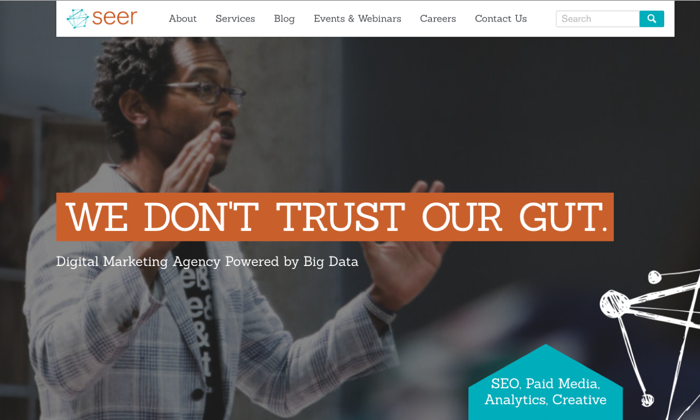
Seer Interactive doesn’t trust their gut; they use their data warehouse and tools to look across millions of keywords instantly. Using big data, they look for new, hidden, and unexpected customer trends in competitive industries. They’re one of the few agencies with a big query environment of 202 million SERP records.
3. Distilled – Best for Technical SEO
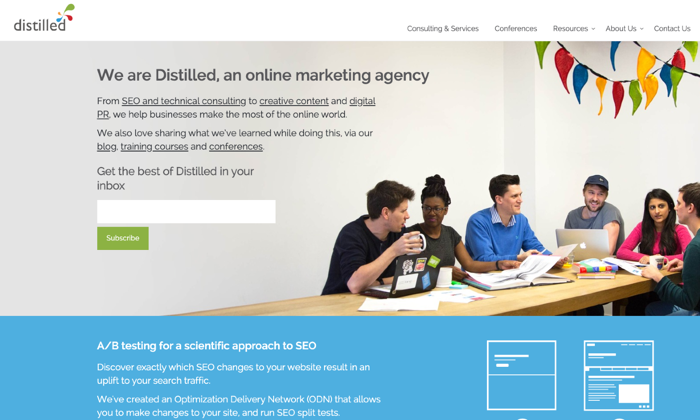
As an agency, Distilled builds its content marketing campaigns around technical SEO. All of the services they offer are oriented around search. Distilled created an Optimization Delivery Network (ODN) that allows clients to make changes to their site and run SEO split tests.
4. Fractl – Best for In-Depth, Research-Heavy Content
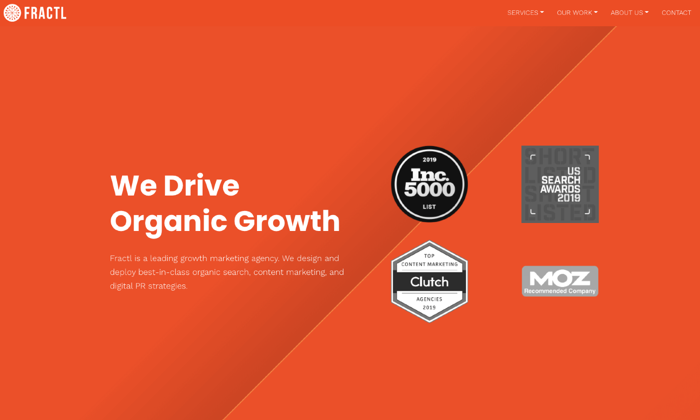
Fractl is a research-heavy, data-driven content marketing agency. They focus on rapid organic growth via a combination of content marketing, data journalism, digital PR, and SEO. They have deep knowledge in specific industries, and they publish original research in journals and well-known publications.
5. Column Five – Best for Data and Content Visualization
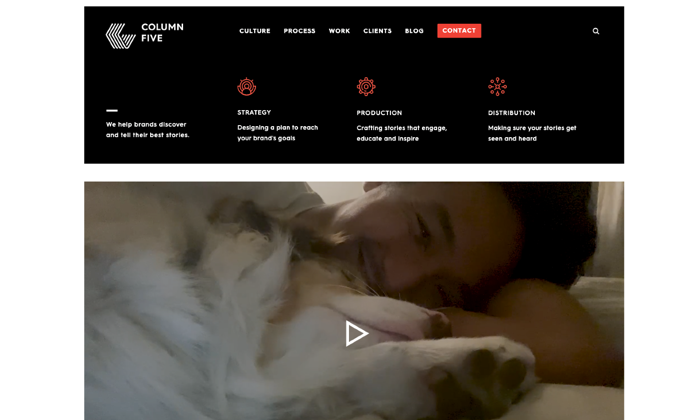
As a content marketing agency, Column Five is focused on the creative side of content development — storytelling, design, data visualization, interactive motion graphics, and exhibition design. Creativity is the priority; their agency uses a mix of organic and paid distribution to promote client content.
8. Single Grain – Best for Conversion-Driven Content Marketing
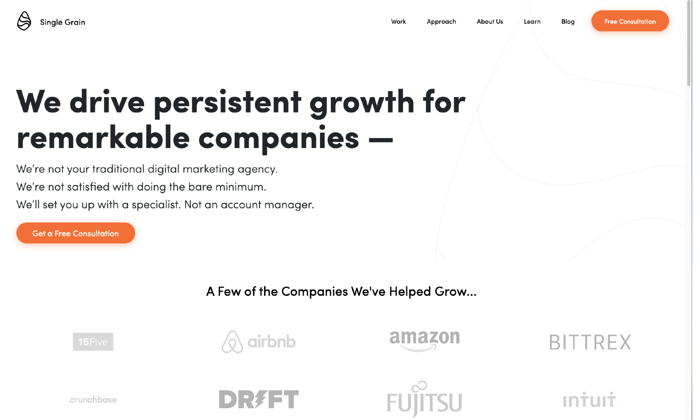
Single Grain uses its content marketing and conversion optimization services to boost client conversions. They’re focused on rapid and consistent growth for each of their clients.
9. The Content Bureau – Best for B2B Content Marketing
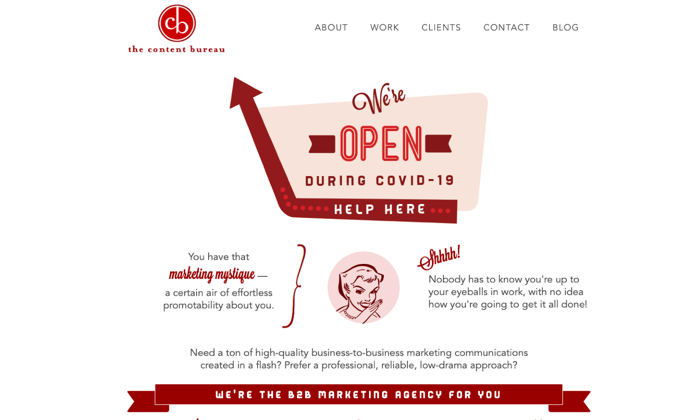
These B2B content marketing specialists are woman-owned, 90 percent female, and fully remote. They’re focused almost exclusively on clients in the tech, VC, and financial sectors, focusing their attention on global corporations that need consistent, year-over-year growth.
10. Web Profits – Best for SaaS Content Marketing
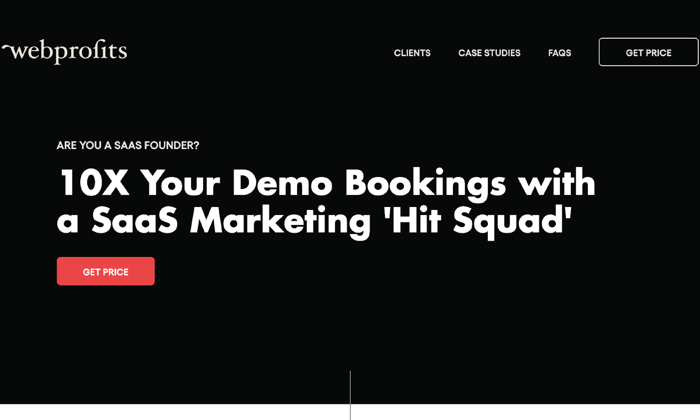
Webprofits focuses exclusively on SaaS content marketing and advertising. These SaaS specialists use their experience as SaaS business owners to build other SaaS clients. They work with large and small clients, including Rackspace and Shopify.
Conclusion
It can be tough to show up day after day with fresh content for your customers. The right content marketing agency makes content development simple and straightforward. Choosing the right content marketing agency isn’t rocket science; you just have to ask the right questions.
It starts with your goals and outcomes.
If you’re aware of the goals and outcomes you want, you’ll know which metrics you need to track to reach those goals. With the right goals and metrics, you’ll be able to find, vet, and choose the right content marketing agency — you’ll have the team you need to generate more revenue for your business.
The post How to Choose The Right Content Marketing Agency appeared first on Neil Patel.
How to Choose The Right Local SEO Agency
Statista says 52 percent of global internet traffic is mobile. A third of all mobile searches on Google are local. Microsoft says the same thing — 53 percent of mobile searches on Bing have local intent. This is pretty big on its own. Then we see data showing that local searches are growing 50 percent …
The post How to Choose The Right Local SEO Agency first appeared on Online Web Store Site.
The post How to Choose The Right Local SEO Agency appeared first on ROI Credit Builders.



